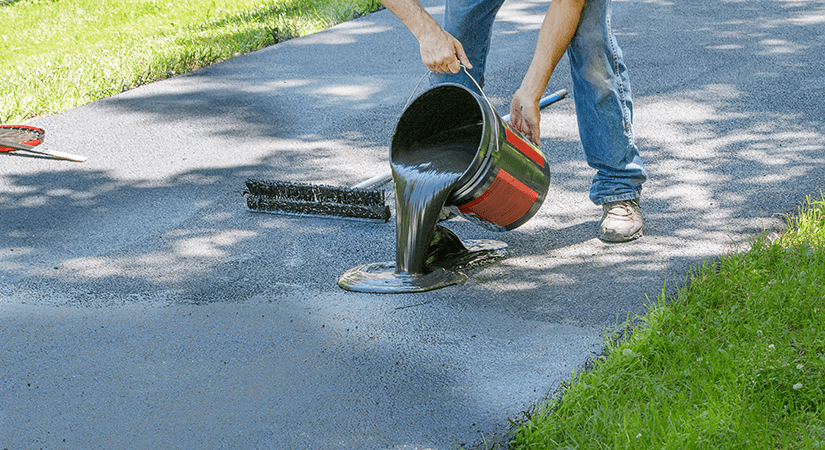Enhance Durability with Cold Mix Asphalt: Professional Sealing Solutions
Enhance Durability with Cold Mix Asphalt: Professional Sealing Solutions
Blog Article
Cold Mix Asphalt Vs. Hot Mix Asphalt: Which Is Right for You?

Make-up Differences
Cold mix asphalt is produced by emulsifying the asphalt binder with water and an emulsifying representative before mixing it with accumulation. The hot mix asphalt production process entails heating the aggregate and asphalt binder individually prior to combining them at the asphalt plant.
In addition, chilly mix asphalt has a tendency to be less thick and extra flexible than hot mix asphalt. This versatility makes it much better suited for areas with higher levels of movement, such as driveways or roads with heavy website traffic. In contrast, hot mix asphalt is understood for its high toughness and resistance to rutting and fracturing, making it a recommended choice for freeways and high-traffic roads where durability is important.
Setup Refine Variances
The procedure of installing cold mix and warm mix asphalt displays significant variations in their demands and procedures. Cold mix asphalt, being an extra versatile material, can be used directly from the bag or container onto the fracture or harmed location. It needs very little preparation work, such as cleansing the location and condensing the cold combine with hand devices. This makes it a practical alternative for quick and momentary repairs. In comparison, hot mix asphalt demands a more intricate installment procedure. It entails heating up the mixture to heats before laying it down on an effectively ready base. The prep work consists of compacting the base, using a tack layer, and using hefty machinery like pavers and compactors for a durable and smooth surface. Due to the heating demands, hot mix asphalt installments are usually executed by specialists with specialized tools, making certain a more structurally audio and permanent outcome.
Toughness and Longevity Factors
When thinking about asphalt choices, durability and long life are critical aspects to review for long-term sidewalk performance. Warm mix asphalt (HMA) is known for its extraordinary durability and durability. The high temperature levels during the laying and mixing process enable better compaction, causing a denser and more powerful sidewalk framework. This brings about HMA being much more resistant to rush hour tons, rough climate condition, and the impacts of aging contrasted to cold mix asphalt (CMA)
In terms of durability, HMA generally outshines CMA as a result of its exceptional toughness and resistance properties. HMA pavements have a longer service life, requiring much less frequent repair services and upkeep, which can equate to cost savings over time. In addition, HMA pavements are much more conveniently adjustable to fulfill certain task requirements, even more boosting their longevity.
Price Considerations
Considering the economic effects is an important element when reviewing the option between hot mix asphalt (HMA) and chilly mix asphalt (CMA) for pavement projects. While the preliminary cost of warm mix asphalt is generally greater than that of cold mix asphalt, HMA commonly supplies an extra affordable option in the future because of its exceptional durability and longevity. HMA is recognized for its capability to hold up against rush hour loads and severe climate condition, minimizing the need for constant repair services and maintenance. On the other hand, chilly mix asphalt is more inexpensive ahead of time yet may call for more frequent patching and resurfacing, leading to higher upkeep costs with time.
Along with product prices, it's necessary to consider the costs connected with installation and maintenance when contrasting HMA and CMA. HMA normally requires specialized equipment and skilled labor for correct setup, which can influence overall job prices. Conversely, CMA is simpler to function with and can commonly be used using less complex methods, possibly decreasing installment costs. Ultimately, the choice between HMA and CMA must take into account not simply the initial expense but also the long-lasting economic implications to determine one of the most affordable choice for the particular pavement project.
Environmental Effect Contrast
Comparison of the environmental influences between warm mix asphalt (HMA) and cold mix asphalt (CMA) exposes distinctive distinctions in sustainability practices. HMA manufacturing requires heats, bring about increased energy usage and greenhouse gas discharges. The procedure additionally releases unstable natural substances (VOCs) and hazardous air contaminants (HAPs) into the environment. In contrast, CMA is produced and applied at lower temperatures, minimizing energy usage and emissions substantially. The reduced production temperature levels of CMA lead to lowered gas consumption and lower levels of CO2 emissions, making it an extra eco-friendly option.
Moreover, the usage of CMA commonly includes recycling existing asphalt pavement, advertising resource preservation and minimizing the amount of waste sent to land fills. By choosing for CMA over HMA, roadway building projects can contribute favorably to environmental preservation efforts.
Conclusion
Finally, the choice between cold mix asphalt (CMA) and warm mix asphalt (HMA) depends on different variables such as composition, installment process, pop over here longevity, longevity, expense, and ecological influence. asphalt patch repair. While CMA offers a quick and economical solution for minor repairs, HMA guarantees premium toughness and longevity for rush hour locations. Take into consideration these elements very carefully to establish which type of asphalt is the ideal selection for your paving requires

Thinking about the economic ramifications is a crucial element when evaluating the option between warm mix asphalt (HMA) and cold mix asphalt (CMA) for sidewalk projects. While the preliminary price of warm mix asphalt is generally greater than that of cool my link mix asphalt, HMA frequently supplies an extra economical remedy in the long run due to its exceptional toughness and longevity. cold mix asphalt.Comparison of the ecological influences in between warm mix asphalt (HMA) and cool mix asphalt (CMA) reveals unique distinctions in sustainability techniques.In verdict, the selection between cool mix asphalt (CMA) and Extra resources warm mix asphalt (HMA) depends on various elements such as structure, installment process, resilience, longevity, price, and ecological effect
Report this page